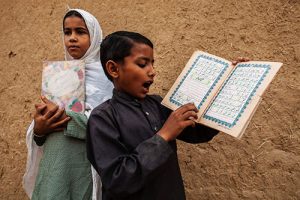The enforcement of a Single National Curriculum (SNC) across the country was one of the pre-election promises of Prime Minister Imran Khan. It remains a project close to his heart. But often good intentions are not enough to ensure success. The acid test lies in their smooth execution, where the Pakistan Tehreek-e-Insaaf (PTI) Government, unfortunately, had let its leader down.
Yes, the SNC had been notified by the textbook boards of Punjab, Khyber Pakhtunkhawa and Islamabad in early 2021, but apparently without any proper homework. As a result, schools are in a quandary in deciding which books to include in their curriculum; booksellers are waiting for the delivery of new supplies; students, especially of private schools, are just passing time and textbook publishers are running from pillar to post to get no-objection certificates for their books.
Punjab, under the unsteady hands of Chief Minister Usman Buzdar, is in the biggest mess when it comes to implementing the SNC. Initially, a Punjab Government notification did not allow private publishers to develop SNC-aligned textbooks for private schools.
This led to the usual protests, and some intense lobbying by the private publishers with the Punjab Curriculum Textbooks Board (PCTB) and the federal and provincial governments, to allow them to develop textbooks aligned with the SNC. This situation caused an overall delay in the notification pertaining to the submission and review process for textbooks and supplementary reading material. And as a result, the PCTB has, to date, failed to issue clearance certificates for textbooks under its review.
There is also lack of clarity on the approval of textbooks for subjects such as Art, Music, and Computers etc. — which are usually taught in the mid- to elite-level private schools. Initially, the official line was that only the SNC-approved subjects would be taught in the upcoming academic year. But there is still a lot of confusion on this issue.

There is another twist in the tale: in Punjab, all books containing religious content have to be approved by the Mutahida Ulema Board (MUB). The MUB has not yet issued a clear review process or a timeline for textbook approvals. This is an added layer of approvals.
The cost of the review of books has also became a controversial matter. The private publishers and review committees are supposed to decide the review cost mutually, which again is seen as a problematic affair by private stakeholders, who argue that the cumbersome and costly process would make textbooks more expensive.
The PCTB has issued letters to all private schools and publishers that no textbook can be used without its approval. However, textbooks for grades 6-8 have not been approved by PCTB. Consequently, private publishers have no approved books to sell to schools for grades 6 onwards, even though they were submitted in 2019. The PCTB is responsible for the delay.
The situation in KP and Islamabad, where the process of review of books started in March and April this year, is equally discouraging. Here again, private publishers and review committees have to decide the review cost mutually.
Moreover, no standard operating procedures (SoPs) have been laid down regarding how textbooks should be reviewed. The standard of textbooks developed by private publishers is higher than government textbooks. The progression in textbooks printed by private publishers is different to that prescribed by the SNC, even after following the national curriculum guidelines. Stakeholders maintain that the reviewers are being too rigid on the progression and fail to take into account the diversity or uniqueness of approach in their texts. They argue that the SNC sets a minimum criteria for learning and there is no bar on teaching additional material in each grade.
Then the SNC was intended to be for the whole country, but each province has different opinions on textbooks. Something which is acceptable in Punjab, is not acceptable in KP or Islamabad Capital Territory. The best way forward is to appoint a single authority for the approval of textbooks for the entire country rather than have separate ones for each province and the capital, which only increases the cost and causes delays. However, the 18th Amendment is a stumbling block in going for this easy and straight course.
The government must also ensure inclusion of all stakeholders in the decision-making process. Unfortunately, in Pakistan’s flawed democracy, it is easier to create problems than to find solutions. It seems as if we will have to reconcile to this non-stop chaos in the education sector for the time being.




Great, heart touching and fact based article.